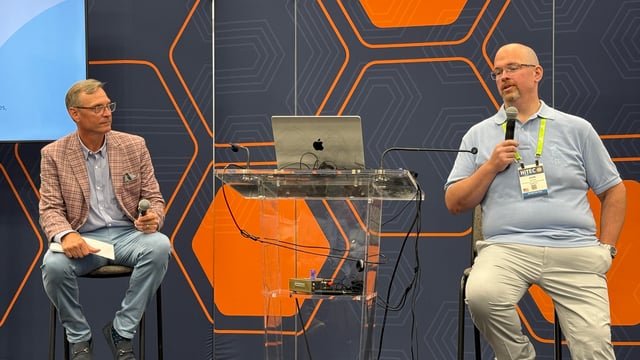
The promise of AI in hospitality isn’t just about smarter service or automation. It’s about building a modern digital foundation that lets hotel teams do more—faster, better, and more personally. That was the core message during HITEC 2025’s session “AI-Powered Hospitality at Wyndham: Redefining Guest Experiences,” featuring Josh Dow, VP of Hotel Technology Strategy & Services at Wyndham Hotels & Resorts, and Jeff Thoman, Senior Regional VP at Salesforce. Their wide-ranging conversation dug into real-world use cases, integration strategy, AI agent management, and where the future is heading.
The Digital Guest Journey Starts with Infrastructure
Dow opened by challenging the assumption that guest experience begins at check-in. “It starts the minute they land on your website, or even before that when they search on Google,” he said. At Wyndham, the technology stack beneath that journey has undergone significant changes. “We’ve re-architected our entire platform over the last five years,” Dow explained, replacing legacy on-prem systems with a modern, API-driven cloud infrastructure.
This foundational work enables Wyndham to more easily surface data about its 103 million Wyndham Rewards members across guest touchpoints—from search and booking to mobile check-in and on-property service. “Now we can plug in new partners and power personalization in a scalable way,” Dow said.
That approach stood in contrast to how many in the industry still approach digital transformation, noted Thoman. “It’s not about standing up a separate AI pilot and leaving it alone. It’s about designing an extensible platform that can support change continuously.”
Start Small, Scale Strategically
For organizations just beginning their AI journey, Dow recommended resisting the temptation to start with complex, multi-functional agents. Instead, he advised finding narrowly defined problems that are easy to automate and deliver clear results. “Just apply small wins and kind of learn from those,” he said. “Don’t go try and tackle that AI robotic concierge.”
Thoman encouraged hotel leaders to think of AI agents as new team members. “You’re good at managing call center reps—now you need to get good at managing AI agents,” he said. That means monitoring performance, tuning responses, and iterating based on feedback. “No one’s still using the first website they built. AI agents need that same mindset: build, launch, refine.”
Real-World Deployments: Empowering People, Not Replacing Them
One of Wyndham’s most prominent AI use cases to date is in its call centers, where agent-assist tools are already transforming guest interactions. “Every inbound call is run through an AI layer that transcribes in real time and surfaces contextually relevant data,” said Dow. For example, if a guest asks about pool availability, the system might display pool hours or an image for the live agent—without the agent needing to dig through systems.
“This is not about replacing people. It’s about giving them superpowers,” Dow emphasized. “When agents have immediate access to loyalty data, stay history, and relevant content, they can have more meaningful conversations.”
Wyndham is also using generative AI in its franchisee portal, built on Salesforce Communities. “Franchisees can use a chatbot to instantly find brand standards, marketing collateral, or seasonal best practices,” Dow said. Interestingly, the tool’s usefulness has extended beyond its original purpose. “Now, our corporate team is using it to quickly help franchisees without escalating to other departments.”
The result? Better service, faster response times, and more empowered team members across the board.
AI + Robotics: The Next Wave
When asked what excites him about what’s next, Dow pointed to the convergence of robotics and AI. “There’s still some evolution needed, but the potential is huge,” he said. He described visiting innovation labs in China where robotics, AI, and sensor data are being combined in powerful ways. “The ability to interpret data and physically act on it—that’s where it gets really interesting for hospitality.”
While still early, Dow believes these advancements will create new service models, particularly in operations and maintenance.
Agent-to-Agent Integration: A Seamless Future
Another transformational shift ahead is agent-to-agent integration—where consumer-facing AI tools can talk directly to hotel systems and others in the travel ecosystem.
Dow used the example of a traveler asking an AI assistant to plan a vacation. “Right now, you get information and then manually go book it. But in the near future, your AI will interact with hotel agents, airline agents, and local tour operators to handle the booking for you.”
Wyndham is already working with partners to prepare for this shift, ensuring its systems are “addressable” by third-party agents. “There’s a real first-mover advantage here,” Dow said.
Advice for Hotel Tech Teams: Find the Right Fit
Dow closed the session by offering practical advice to hotel tech leaders looking to implement AI. “Walk the show floor. Ask questions. Talk to vendors,” he said. “But then go back to your team and ask: where can this realistically help us today?”
Both Dow and Thoman emphasized the need for ongoing ownership and iteration. The best AI applications, they noted, aren’t flashy—they’re useful.
“You don’t need a moonshot to get started,” Dow said. “Find the easy wins and build from there.”







